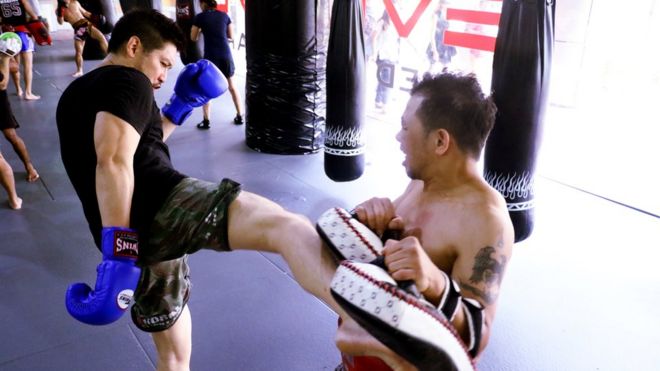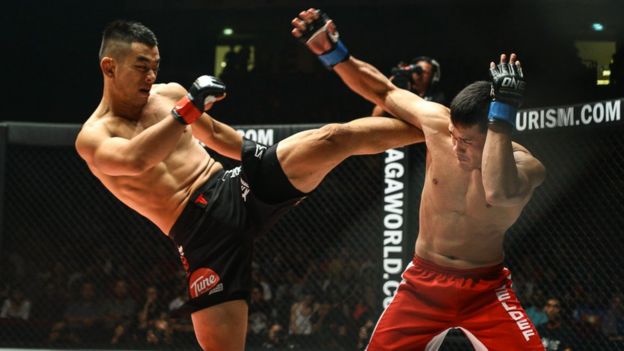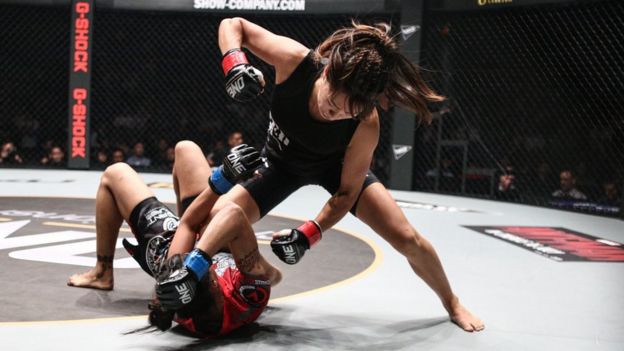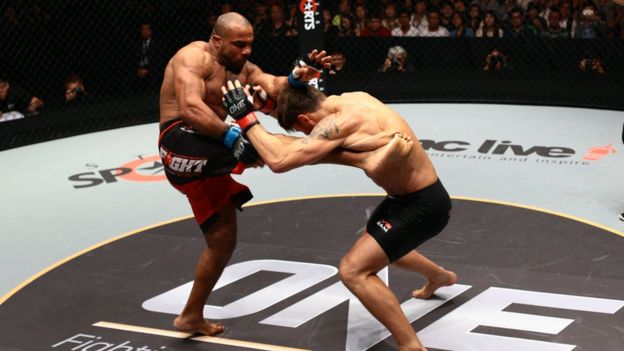- 17 July 2016
- Business
Fighting fit: How one man built a martial arts empire
 CHATRI SITYODTONG
CHATRI SITYODTONG
Born and raised in Thailand to a wealthy family, Chatri was studying at the prestigious US college in the late 1990s when the Asian financial crisis hit.If Chatri Sityodtong didn't party that much at Harvard University he had a good excuse - he had to share his dormitory room with his mother.
Back in Bangkok, amid the sharp economic downturn, his father's property company collapsed and the family lost everything.
Their home was repossessed, and bank accounts seized. Then Chatri says his dad ran away, abandoning them.
 JOE RAEDLE
JOE RAEDLESurviving on $4 (£3) a day at his "lowest point" at Harvard, Chatri says his younger self vowed to to restore his family's fortunes using the mental strength he had gained from his life-long dedication to martial arts.
"We were left in completely bleak circumstances," he says. "It was my years of martial arts training that gave me the courage, the work ethic, and the desire to fight for my dreams, that enabled me to bring my family out of poverty."
Within a decade Chatri was a multi-millionaire who ran his own investment fund on Wall Street. And today he is the founder and boss of one Championship, a televised East Asia-wide mixed martial arts competition that is broadcast to more than one billion homes.
'Something missing'
To be able to afford to stay at Harvard, where he was doing a master's degree in business administration, Chatri took out bank loans and started to teach muay Thai, the Thai martial art that resembles kickboxing.
Chatri had spent his teenage years training in the discipline, and even competed professionally a few times.
 CHATRI SITYODTONG
CHATRI SITYODTONGJuggling his studies at Harvard with teaching muay Thai, Chatri also found the time to launch a start-up company with a fellow student.
Their business was a software start-up called Next Door Solutions.
Continuing to run the firm after graduation, Chatri and his business partner moved to California and secured $38m of investment.
A few years later they sold the business for an undisclosed fee. While Chatri says he didn't pocket "enough to retire on", it was his "first taste of escaping poverty".
After Next Door Solutions, he decided on a complete change, and moved to New York to pursue a career on Wall Street.
 CHERYL TAY
CHERYL TAY"I was always fascinated by the stock markets, I wanted to learn about the world of global finance," he says.
Working for two large investment funds, Chatri was so impressed that in 2005 he got backing to launch his own. His business Izara Capital Management looked after $500m of investments.
But aged 37, and by then a multi-millionaire, he says he realised he wanted another change.
"When I was dirt poor, I always felt that when I made millions I'd be happy, and all my problems would be solved," says Chatri. "But something was still missing, I didn't feel fulfilled, I didn't feel I was doing what I wanted to be doing."
So in 2008 he decided to quit banking and go back to his "first love" of martial arts.
'Determined'
Chatri was living in Singapore at the time where he had located himself to launch an Asian branch of his investment fund.
Wanting to set up some sort of martial arts business, his brainwave was the fact that there wasn't a pan-Asian martial arts competition.
 DUX CARVAJAL
DUX CARVAJALSo he decided to launch such a thing, which he would televise.
It would be a mixed martial arts tournament, meaning that fighters could use any form of martial arts. So a person expert in muay Thai could go into the ring against someone who has a black belt in karate.
Thanks to Chatri's decade on Wall Street, he had the contacts he needed to raise the required funds. And at the same time his martial arts background meant that the various sports governing bodies were confident enough in him to come on board.
And poaching sports broadcast talent from around the world, his business, the one Championship, was launched in 2011.
An immediate success, one Championship fights are now broadcast on Fox Sports Asia.
There are 10 different weight classes for men, and one for women. Meanwhile the events are held in China, Indonesia, Malaysia, Myanmar, the Philippines, Taiwan and Thailand.
 CHERYL TAY
CHERYL TAYWhile one Championship has not released its financial details, Chatri says it is on track to achieve a market value of $1bn "in the near future" thanks to broadcast revenues and ticket sales.
James Goyder, a sports journalist who has been writing about Asian mixed martial arts for almost a decade, says Chatri is undoubtedly "determined, focused and driven".
"In less that five years he has grown one Championship into one of the most recognisable sporting brands in Asia," adds Mr Goyder.
Although one Championship is currently a lot smaller than its US mixed martial arts rival, Ultimate Fighting Championship (which was recently sold for $4bn), some commentators say that one has bigger growth potential because of its dominance of the Asian marketplace, and the region's vast population.
One Championship is holding 15 events across East Asia this year, compared with just one for Ultimate Fighting Championship.
While a one Championship fight can look pretty brutal, Chatri - who still practises muay Thai - insists that people in the West still have a "misconception that martial arts are all about fighting and violence".
"The reality in Asia is that it is a lifestyle, and a platform to unleash your potential as a human being."
'Sports Management & Marketing' 카테고리의 다른 글
| 전 세계 팬이 보는 LCK.."한국의 EPL" (0) | 2016.08.04 |
|---|---|
| 스티브 잡스 문제해결 능력 10가지 (0) | 2016.07.31 |
| 스포츠·전시 함께 품은 'S마이스' 뜬다 (0) | 2016.07.15 |
| 요가복 하나로 2조원 벌어들인 남자, 칩 윌슨 (0) | 2016.07.14 |
| 왜 한국엔 글로벌 스포츠 브랜드가 없을까 (0) | 2016.07.06 |